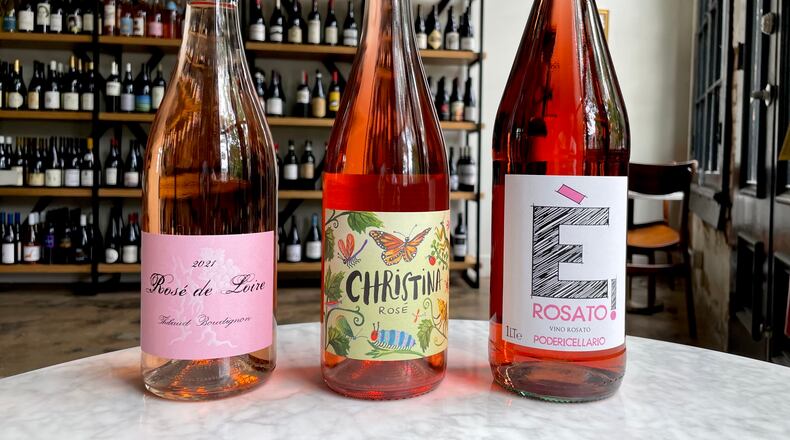This century has seen two concurrent wine trends: the acceptance and ubiquity of rosé, and the rise of natural wine.
Rosé now has a year-round presence on menus and retail shelves across the U.S., but sales spike around Memorial Day. Temperatures rise, and responsibilities wane, right around the time the fresh vintage of rosé wines starts arriving in shops. However, just because rosé is symbolic of the start of summer, and embodies effortless imbibing, that doesn’t mean you can’t seek out something of quality.
So, let’s use the relatively low intimidation factor of rosé to introduce the sometimes intimidating — and often confusing — category of natural wines.
Perhaps you have yet to explore the more natural side of wine, and may be wondering just what it means. Essentially, these are wines with minimal intervention: little is added or taken away, both in the fields and during fermentation. No chemical pesticides or herbicides are used in the vineyards. Minimal or no sulfur dioxide is added in production. Fermentation happens with the indigenous, naturally occurring yeast, rather than a controlled fermentation with cultured yeast.
Producers of natural wine share a goal of holistic, regenerative agriculture. While some seek organic or biodynamic certifications for their wines, other producers prefer not to be codified, and create their own system, based on the unique needs of their vineyards, and their own philosophy. At its core, natural wine is about working with nature and all its character, rather than trying to manipulate it.
Within the category of natural wines (much like with rosé) there are many more styles than one might think. Some are hazy in appearance and a little funky; others, clean and classic. Regardless of style, we love the vibrant, living character of a natural wine.
Here are three natural rosé wines — all priced in the low to mid-$20s — that we find delightful to drink:
Thibaud Boudignon rosé de Loire 2021. Boudignon is reverent to the soil of the Loire Valley of France in a way that you can taste, and we excitedly await the release of his small-production wines every season. Made from cabernet franc, this delicate wine has intense aromatics of nectarine and ripe strawberry, and a refreshing salinity.
Christina rosé 2021. Christina Netzl converted her family’s centuries-old farm to organic farming in 2013, and started making her eponymous natural wines two years later. Last year was an exceptional vintage for Austria, and it shows in the lush fruit of this wine, made from the zweigelt grape. Juicy watermelon, heather and lush raspberry tones abound.
Poderi Cellario e’ rosato 2021. The Cellario family is in its third generation of winemakers in the Piedmont region of Italy, and they make delightfully quaffable natural wines from the region’s traditional grapes. This deep-hued rosé is made from dolcetto and nebbiolo. Loaded with tart red fruits, it’s a cranberry and cherry delight. Bonus: It comes in a very shareable 1-liter bottle format.
The Slaters are beverage industry veterans and the proprietors of the Expat and the Lark Winespace in Athens.
Sign up for the AJC Food and Dining Newsletter
Read more stories like this by liking Atlanta Restaurant Scene on Facebook, following @ATLDiningNews on Twitter and @ajcdining on Instagram.
About the Author
The Latest
Featured


